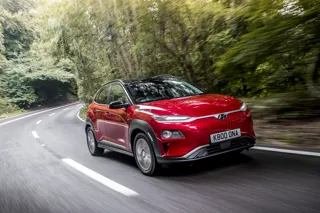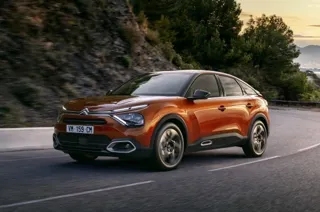The coronavirus pandemic is changing the way people work, with fewer face-to-face meetings and an inevitable decline in company car mileages.
Three-quarters (74.8%) of respondents to a Fleet News survey say they expect greater use of video conferencing in the long term.
Almost 61% also expect to see average mileages of their company car fleet fall.
ONS figures released in March 2020, revealed some 1.7 million people were working mainly from home out of a working population of 32.6m.
In a separate Fleet News poll, some two-thirds (68.1%) of respondents said working from home will become their 'new normal’.
Andy Eastlake, chief executive of the Low Carbon Vehicle Partnership (LowCVP), says lockdown has shown that many more meetings can be conducted virtually, cutting company car mileages, while office attendance will reduce significantly as more people will continue to work from home.
“What all this means is that the drivers behind the choice of company car will change and the benefits of electric vehicles will be even greater,” explained Eastlake.
“With the driving range and availability of standard electric models increasing all the time, choosing a full battery EV (BEV) has, in any case, been becoming a more obvious choice for many more company drivers.
“Add to this, the new company car tax rules and the possibility of additional Government incentives coming down the line, not to mention access restrictions in several urban areas affected by air quality issues, and the choice will soon become even more compelling.”
Company car drivers will pay no tax on a pure EV this tax year, while drivers of plug-in hybrid electric vehicles (PHEVs) are also enjoying much more favourable rates.
The latest figures from the Society of Motor Manufacturers and Traders (SMMT) show diesel new car registrations were down 60% and petrol fell 40% compared to June 2019's figures.
However, BEV registrations increased massively last month, compared to June 2019.
There were 8,903 pure electric new cars registered in June – a 262% increase on the 2,461 pure EVs sold in the same month last year.
Registrations of plug-in hybrid electric vehicles (PHEVs), meanwhile were up 117% year-on-year, from 2,270 units in June 2019 to 4,926 PHEVs registered last month (June).
Ashley Barnett, head of consultancy at Lex Autolease, said: “The coronavirus outbreak has proven extremely challenging for the new vehicle market, but even during the height of lockdown, monthly EV registrations were still up year-on-year.
“We see emerging from lockdown as a clear opportunity to accelerate the progress that’s already been made in terms of cleaning up our roads – especially because a shift towards more flexible working patterns and the need for less business mileage could make EVs more practical for more people.”
The appetite for electrification is increasing among fleets, with leasing companies reporting record levels of demand from company car drivers, according to the June digital edition of Fleet News.
Dr Mike Brown, director of strategic partnerships at The University of Salford, told Fleet News: ““For the company car driver post-COVID-19, business is going to be totally different.
“It is highly unlikely face-to-face meetings are going to be a frequent feature of business anytime soon resulting in significantly lower business mileage leading to painful personal tax implications. This will add further impetus for company car drivers to consider switching to electric.”
Lauren Pamma, electrification propositions lead at Lloyds Banking Group, is charged with helping to drive EV take-up at Lex Autolease and Black Horse. She believes lower mileages, with more video conferencing and more employees working from home, could bring pure electric powertrains into scope for more company car drivers. “On the whole, I think it will accelerate that adoption,” she said.
However, she stressed the biggest consideration for fleets was judging an EV’s suitability on a wholelife cost basis. She explained: “If on a wholelife costs basis, EVs continue to compare well to internal combustion engine vehicles, fleets will increasingly make the switch.”
In a post-COVID world, Arval UK is also expecting overall mileage profiles to drop, however, consultant David Watts told Fleet News: “This is not relevant to the uptake of EVs within company car fleets as the profile of individual journeys will continue to be the same, even if they are made less often.
“The focus on annual mileage is a general misperception around the feasibility of an EV for a company vehicle driver when the focus should be on the daily and overall journey mileage.
“With an average real-life range of around 190 miles, EVs are, in principle, appropriate for all company car drivers so it’s just a question of how easy or hard it will be and how willing the driver is to manage the longer journeys.”
Watts says a “quick half-hour stop” at a rapid charger will give a driver an extra 80-100 miles of range, essentially negating the range issue for longer journeys. “A stop which should naturally be factored into any long journey for health and safety reasons,” added Watts.
Matthew Walters, head of consultancy and customer data services at LeasePlan UK, says it is important to move the focus away from mileage and onto the nature of the trip.
He explained: “It’s more than just looking at the mileage profile of your employees and saying anyone who drives up to 10,000 miles is suitable for an EV, while those who do more than 40,000 aren’t.
“It’s about analysing the make-up of each trip, including the locations, the regularity and the available infrastructure to support it.”
He said: “Once companies start to use this information, they’re likely to be able to find more ways of making EVs fit for their fleet.”
Fleets urged to review vehicle contracts
Peter Golding, managing director at FleetCheck, said Covid-19 had created a range of potentially quite dramatic changes in key leasing variables.
He explained that the leasing terms used by most fleets were created for a world of business travel that no longer exists and is unlikely to return to pre-pandemic levels.
“The rise of video-conferencing means the likelihood of much reduced mileage for many drivers while there will also be, in many organisations, sadly, the need to make redundancies,” he said.
“What all of this this means is that the mileage and year cycles in your current leases are potentially, even probably, no longer appropriate.
“Fleets need to work out what will be needed in the future and talk to their leasing providers about making changes.”
Golding suggests fleets should consider conducting a review of their fleet policies in order to incorporate all of the changes that were now occurring.
“While lease contract changes may present themselves as an immediate problem, the truth is that now is a good time to start looking at your fleet policy in detail,” he said.
“The coronavirus crisis has had a wide-ranging impact and there are many issues to be considered.”























Login to comment
Comments
No comments have been made yet.